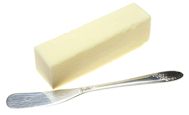 Q: Heather – I was curious about how my body would react to heavy whipping cream and butter. I know I have problems with the proteins in dairy, but do you know of anyone who has to skip out on the high protein dairy products like yogurt and cottage cheese but can handle the ones that are mostly fat?
Q: Heather – I was curious about how my body would react to heavy whipping cream and butter. I know I have problems with the proteins in dairy, but do you know of anyone who has to skip out on the high protein dairy products like yogurt and cottage cheese but can handle the ones that are mostly fat?
A: Alisa – The answer to this question hinges on the level of milk sensitivity and the product in question.
In general, heavy cream will offer little relief to someone who is sensitive to milk, and will still pose a threat to the milk allergic. Cream varies in grade depending on the country. In the U.S., heavy cream or heavy whipping cream is defined as 36% milk fat or higher. It is the higher-butterfat layer skimmed from the top of milk before homogenization. Increasing the fat “pushes out” some of the proteins, but not all. For example, skim milk contains about 8 grams of protein per cup, while fluid heavy cream contains just under 5 grams of protein per cup. There is certainly enough protein remaining in heavy cream to cause problems for most people who are sensitive to milk proteins (whey, casein, or otherwise), and it is definitely an unsuitable food for those with moderate to severe milk allergies …
Dairy butter is a much more controversial topic. It is usually derived from cow’s milk; though it can be made from other mammals (see Go Dairy Free for a discussion on the various types of mammal milk). Commercial butter is primarily butterfat and water, though it would be rare to find a protein-free dairy butter. A small amount of milk protein typically remains in commercial dairy butter, but I have heard positive reports from many people with milk sensitivities or moderate milk allergies who could tolerate butter, at least in small doses. Because at least trace amounts of milk protein (or more) would typically remain in dairy butter, I would not recommend it for those with severe or life-threatening food allergies, and even those with less severe milk allergies should tread lightly.
Ghee, otherwise known as clarified butter, takes the fat to the next level. Dairy butter is simmered until all of the water has boiled off and the milk protein has settled to the bottom. The “pure” butter fat is skimmed off, leaving the milk solids behind. Because of its extremely high fat content, ghee is usually shelf-stable, and can be stored without refrigeration in an air-tight container. Though it is seen most often in Indian food, ghee can be used in place of dairy butter for most applications and it is becoming increasing popular among the casein-free community. Some food companies that tout themselves as gluten-free / casein-free (GFCF), such as gluten-free meals, do use clarified butter in some of their products.
Because it could still contain trace amounts of milk protein, those with moderate to severe, or life-threatening milk allergies should use caution. However, I have been contacted by many people who follow a casein-free or whey-free diet, whether for autism, other autoimmune diseases, mild to moderate milk allergies, or milk protein sensitivities, and told that they are able to tolerate ghee without a problem.
Keep in mind, none of the above dairy foods are suitable for those who are seeking to avoid dairy products completely, whether for health, religious, or social reasons. Also, if milk allergies are a concern for you, consult a physician before trialing any dairy foods.
For more dairy-free Q&A topics, see our Ask Alisa Page.


10 Comments
I have a strong intolerance to protein in cow products, but I’m not affected by butter and eat it all the time. I can also eat and drink goat, sheep and water Buffalo cheese, milk and yogurt without issues. I don’t understand why. Also, the problem is some of these products are hard to find… such as sour cream and parmasan cheese etc. Recipes that call for heavy cream I avoid because I don’t know if it will cause me problems. If butter doesn’t affect me, will heavy cream?
Hi Molly, in addition to the post above, I recommend reading this post -> https://www.godairyfree.org/ask-alisa/ask-alisa-does-goat-milk-and-cheese-qualify-as-dairy-what-about-sheep-milk-products
As for cream alternatives, see this section -> https://www.godairyfree.org/dairy-substitutes/how-to-substitute-cream
And search what you are looking for (ie “heavy cream” or “sour cream”) in the search at the top of our website. You’ll find many easy recipes and products for all of your needs.
Unlike butter, which is high in fat but very low in protein and lactose, heavy cream is high in lactose, protein, and fat. People who have issues with milk protein and/or lactose are typically advised to avoid heavy cream by their doctors. I would speak with your physician to find out what they recommend testing.
I’m another one who is only allergic to casein! I can eat whey without a problem and small amounts of butter. Haven’t ventured to try cream cheese or heavy creams yet. Milk fat doesn’t effect me at all. But my body reacts to casein just like it does to gluten- doc said it’s cross reactivity because the proteins (gluten and casein) “look” similar. It was interesting. Wanted to share in case it helps anyone else wondering here. Thanks for a great article!
Hello ALISA ! What about cream cheese? it has less that one gram of protein, so that means very low casein right? I get mucus from casein/milk, so I can have butter… not no milk. And what the heck is the difference from Whey and casein? I can’t find clear infor?
Hi Kyra, you would need to consult your physician. If you are sensitive or allergic to a milk protein, then that typically means you should completely avoid that milk protein (even small amounts and even trace amounts in the case of severe allergies), but only a doctor can advise on what might be safe for you to try. I cannot provide you with any direct medical or dietary advice.
Whey and casein are both types of milk protein. Do you have a copy of Go Dairy Free? All of this information is provided in that book -> https://www.godairyfree.org/go-dairy-free
I’ve actually learned that my milk allergy is to whey, and I can tolerate ultra-pasteurized milk, and cream–though I can’t tolerate ghee well. The ultra-pasteurization alters the proteins so that my body doesn’t recognize them as allergens. This discovery has been a blessing to my life as it opened so many possibilities.
This is a little known fact. I can have a coffee or matcha at a coffee bar that can heat the milk product high enough to denature the protein. Pasteurization happens round 160 so i ask for 180 to 200 heated milk and cooled.
All milk sold in our grocery stores is pasteurized, which is a short burst heating process. But this doesn’t make it safe for milk allergies. (I believe you are referring to UHT, which is at high temperatures, regular pasteurization is at about 100 degrees). Whey is somewhat susceptible to denaturing at high temperatures when heated for 15 minutes, but casein is more heat stable. In most studies, where they try to reduce allergenicity of milk, they heat the milk for 30 minutes or more. A quick heating at the coffee bar will unfortunately not denature casein proteins, and will likely have little effect on other milk proteins such as whey. Studies thus far have shown that prolonged heat is required. Here is a great study outline to explain it in more detail -> https://www.ncbi.nlm.nih.gov/pmc/articles/PMC3634986/
And even with this process, it has only found to be safe for some people with IgE allergies, not all. And no tests have been done on efficacy for people with non-IgE reactions, that we have seen.
I’m in sheer bliss from reading this about ghee. I have a milk allergy, and so I can’t have regular butter. I can’t wait to try ghee! Thank you!
Pingback: Milk Food Challenge: Bad News, Good News | Dairy-Free Switzerland